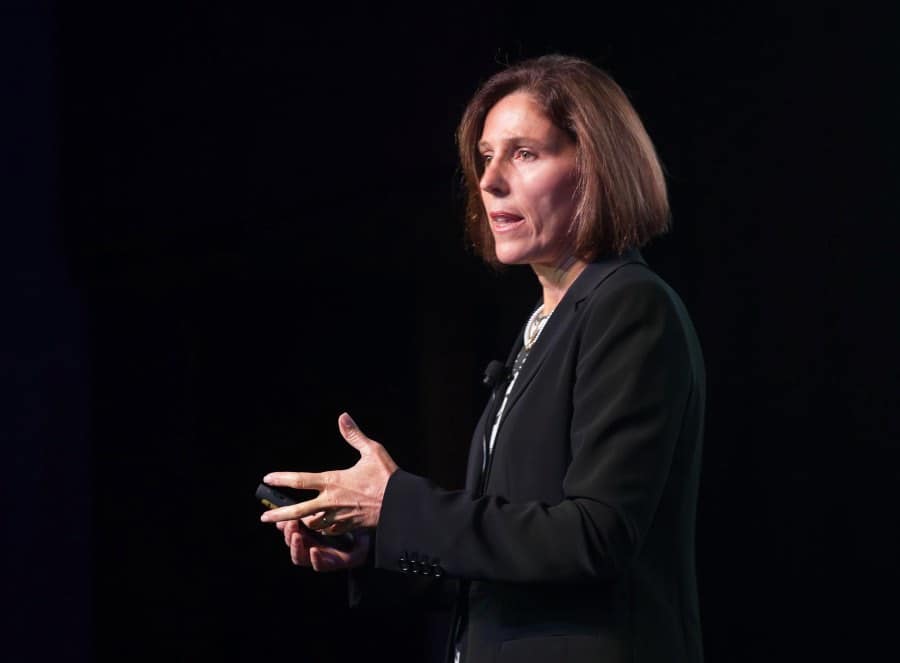
Above: Mariana Castro speaking at a 2014 M4 event at the Hyatt Regency. Photo by Mark Lyndersay
Originally published in Newsday’s BusinessDay for August 27, 2020
Microsoft’s Partner Summit went virtual this year, moving the intensive engagement with its network of developers and vendors to a potentially more accessible virtual event.
The Redmond software company doesn’t sell most of its software products directly to customers.
The desktop products, Windows and Office, usually come preloaded on new PCs and its higher end business-focused products, now with an emphasis on cloud delivery, are sold through an elite group of programmers and solutions providers that the company describes as its partner network.
The message from Microsoft’s Latin America and Caribbean VP for Sales, Mariana Castro to the company’s partners was straightforward and echoed throughout the presentations on the first day of the event – help customers to respond, recover and reimagine their businesses.
Castro encouraged attendees to listen to customers and to respond to them on their own terms in a business environment that the company measures in as declining.
According to current Microsoft’s analysis, only China is showing positive signs of recovery at 0.03 per cent of GDP growth.
The US stands at a negative 5.8 percent and the LaTam sector is almost double that at -10.5 per cent.
Microsoft projects that growth in 2020 through 2021 is likely to be moderate at 5.4 per cent and hopes to participate in that pattern of recovery by ramping up its cloud services.
The company measures cloud service uptake at only 45 per cent relative to on-premises server systems and expects the business to grow from $5.9 billion in 2020 to $13 billion in 2023.
“We need to move all the way to the reimagining phase,” Castro said.
“What do companies really want?”
From Microsoft’s perspective, those needs are security collaboration, business continuity, simplified processes and digital agility, reduced costs and meaningful jobs that reignite the economy.
Herbert Lewy, General Manager, Microsoft Caribbean, noted that the company had experienced 23 per cent year over year growth (15 percent normalised) and seen 600 per cent growth for the company’s Teams remote collaboration product, offered for free at the onset of covid19 restrictions.
Lewy noted that Microsoft had made an impact on the education and learning sector in the Caribbean, with a special emphasis on TT, St Lucia and St Vincent and delivered applications to the Ministry of Health to automate systems and help the ministry to understand how they needed to respond to the covid19 crisis.
He also identified out the use of Teams by governments in TT, Jamaica and Belize, noting that the TT Cabinet made use of Teams to enable remote work and operational continuity.
The company’s cloud solutions also allowed the TT private sector to use remote access systems that made it possible to use existing hardware without increasing investment, while maintaining security and compliance. The company intends to ramp up its solutions pitches to customers for its Azure, Microsoft 365, messaging and Dynamics 365 products.
“Microsoft has set a target of helping 17 million SMB’s in LaTam and one million in the Caribbean specifically to use the cloud to improve their infrastructure.” – Roberto Icasuriaga Gatti
The company’s Leapfrog LaTam plan focuses on Azure Lighthouse, a systems as a service (SaaS) cloud product with an emphasis on security.
“Cybercrime grew at the same pace that we were increasing our networks,” Lewy said.
Roberto Icasuriaga Gatti, Director of Small Medium Businesses and Digital Native Companies announced growth in the Caribbean of 63 per cent for Azure and 25 per cent each for Microsoft 365 and Office 365.
“Microsoft has set a target of helping 17 million SMB’s in LaTam and one million in the Caribbean specifically to use the cloud to improve their infrastructure,” Gatti said.
“Microsoft’s partners in the Caribbean are usually solutions providers, providing security, data and AI driven solutions, developers creating industry specific solutions, and the growing field of cloud solutions providers who are working on projects with recurring revenue are best equipped to reach the small businesses that Microsoft wants to build more business with.”
“Those developers will find a lot of solutions available in the Microsoft 365 platform.”
TT-based Darren Mohammed, Corporate Lead for Small, Medium and Corporate accounts explained that Microsoft had analysed existing data on the company’s Caribbean customers using AI to design the assistance that was offered to companies after the covid19 restrictions were instituted.
Mohammed oversees seven field specialists who cover the Caribbean region.
The company has 327 customers in its managed space on Azure for LaTam, with 176 of those companies coming from the West Indies, driving 76 per cent of the revenue for that business segment.
Mohammed emphasised that co-selling will be a part of the company’s strategy going forward, sharing business opportunities with its partners and offering comprehensive support for partners who look to the company for assistance.
That corporate sector, consisting of large companies with mature IT departments, is likely to be already using Microsoft products and represents an opportunity for incremental growth.
Further down the business pyramid are the medium businesses, representing 28 percent of customer potential and small businesses of between one and 24 employees that create a base of potential at 67 per cent.
Small businesses are likely to have minimal or no IT deployments and represent a challenge for partners but offer significant market potential.
Microsoft plans to support partners with investment programmes designed to encourage onboarding and development programmes that introduce new users to cloud accelerators, azure migration and solution assessments.
Diego Bekerman, GM for Small, Medium and Corporate Accounts, Latin America urged partners to take the time to engage that segment of the market.
“Go deep to understand the needs of these customers,” Bekerman said.
“Use the learnings of the last six months.”
“There are many unserved customers, many unserved organisations in the region, what we call dark-to-cloud companies. There is greenfield all around.”



